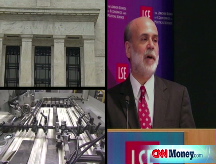Fed: Long view better, short term stinks
Fed chief Bernanke unveils long-term forecasts, saying public has 'right to know.' Central bank's '09 outlook is grim.
NEW YORK (CNNMoney.com) -- The economy stinks, and the Federal Reserve wants to tell you all about it.
The Federal Reserve, in painting a dour picture of the current situation, announced on Wednesday new initiatives to increase disclosure of its economic forecasts and unprecedented lending programs.
Federal Reserve Chairman Ben Bernanke, in a speech in Washington, D.C., said the central bank will begin to publish quarterly long-term economic projections. The outlooks will offer six-year forecasts on unemployment, inflation and economic output. Previously, the U.S. central bank only made public its estimates out to three years.
The first long-term forecast, released Wednesday, said that the economy would grow 2.5% to 2.7% in the several years after 2011. The Fed also predicted that the unemployment rate would fall to 4.8% to 5% and inflation would moderate at about 1.7% to 2% during that time span.
The forecast for 2009 was far less rosy. The Fed expects gross domestic product to decline by 0.5% to 1.3% in 2009, and the unemployment rate to rise to 8.5% to 8.8%. GDP fell by 3.8% in the fourth quarter of 2008, and unemployment stands at a 17-year high of 7.6%.
Consumer prices this year are expected to rise just 0.3% to 1%, well below the Fed's perceived target of 1% to 2%, according to the Fed.
Bernanke said that increased clarity about the Federal Open Market Committee's forecasts will ultimately help improve economic conditions.
"This further extension of the quarterly projections should provide the public a clearer picture of FOMC participants' policy strategy," Bernanke said. "Also, increased clarity about the FOMC's views regarding longer-term inflation should help to better stabilize the public's inflation expectations, thus contributing to keeping actual inflation from rising too high or falling too low."
Bernanke said that the central bank will improve disclosure amid heightened public concern about the enormous expansion of its balance sheet.
Accordingly, the Fed will unveil a new Web site in the coming days that will make clearer the public information the Fed already makes available. The Web site will give enhanced explanations of the recent Fed actions to boost lending and will analyze their effect on the financial markets.
In addition, Donald Kohn, vice chairman of the Federal Reserve Board of Governors, will head a committee to review the Fed's disclosure policies related to its lending practices, Bernanke said.
The Fed chief said the moves were made to improve public access to information.
"The presumption ... will be that the public has a right to know, and that the nondisclosure of information must be affirmatively justified by clearly articulated criteria for confidentiality," Bernanke said.
"I firmly believe that central banks should provide as much information as possible, both for reasons of democratic accountability and because many of our policies are likely to be more effective if they are well understood by the markets and the public," he added.
In the meantime, Bernanke sought to assure the public that the credit risk of the Fed's lending is "extremely low," saying that the Fed's assets pay interest, which generates a "significant" source of income for the Treasury. ![]()


